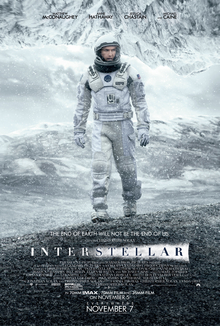I can still remember the feeling of awe when I first saw the teaser of Interstellar a year ago. Several scenes in the movie evoked the same feeling in me. This may not be Nolan's best but still is a pretty good movie.
A lot has been said about the science in Interstellar. Who better than real scientists to give their views on it: Dr. Neil deGrasse Tyson and Phil Plait (who also corrected himself here), and Katie Mack. For a self-proclaimed science enthusiast like me with a particular love for astronomy, this particular aspect seemed intriguing. Although I never really expect Christopher Nolan to make a very science-centric film. His sci-fi films seem more philosophical in nature, that ponder on the human implications of science & technology. Inception never really dealt with the actual process of "dream sharing" but rather its implications. Interstellar is along the same lines. The depiction of wormhole travel and the rendering of the black hole were superb. I loved how they depicted concepts like higher dimensions and relativity, and integrated them thoughtfully into the storyline. The warping of space-time on and near the event horizon was demonstrated visually as well. On a more philosophical note, the way the characters rue the death of scientific temperament & exploration, echoes what many scientists say. From my less-than-expert knowledge, I could immediately note some problems. The communication by Cooper with himself and his daughter through the Tesseract seemed weird. The on-the-fly navigation decisions were also pretty far-fetched. Using gravitational slingshot for travel requires pretty precise calculations, and doing it on a random neutron star or black hole ain't no piece of cake.
The storyline is very solid. I starts with a very grim, but very possible, future and works its way to a happy ending. It still would be depressing if we messed up earth so much that we have to risk our lives in this manner than be able to fix it. The visual effects and cinematography are breath-taking and what we have come to expect from Nolan. It is the actors & actresses that are really at the forefront with good performances for all the major characters. This was crucial in a movie that focused a lot on the psychological struggle of an endeavour of this nature.
Honestly, I can brush aside the minor scientific flaws in a movie that overall celebrates science and puts it front & center like few others have done. Like I pointed out before, Nolan is expected to bring the human element to sci-fi. If I have any real complaint about the movie, it is about how this is handled in the movie. If this is a movie about humanity, there should be more of "humanity". Hollywood tends to be US-centric for obvious reasons, but you would expect someone like Nolan to have a more worldly view. Think about the demographics of NASA. In a dying world presented in the movie, won't those smart brains have already left the US for their homes in Europe, Asia? Also, other countries are taking great strides in space exploration. NASA isn't the only player in the game anymore, and it definitely won't be in such a future. Undertaking a mission of this magnitude will require help from several agencies. It was good to see both male & female scientists in the movie working together. There was the token black guy on the crew, but there seemed to be no people on the ground or in the crew from two huge nations that are showing promise for space exploration: India and China. Would have made more sense for this to be a world-wide effort. Although, I did like the nod to Indian engineering acumen (where did that come from?) in the autonomous drone scene.
To conclude, I am glad this is a movie that truly embraces science & exploration. Our universe is awe-inspiring, and there's only a handful of movies that really bring out the majesty of it.
To conclude, I am glad this is a movie that truly embraces science & exploration. Our universe is awe-inspiring, and there's only a handful of movies that really bring out the majesty of it.



